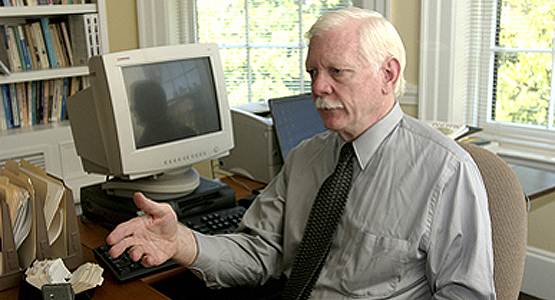The Trapdoors of Political Power: Keylor on Gonzales
BU prof weighs in on the downfall of Alberto Gonzales

When Alberto Gonzales announced his resignation last week, President Bush claimed that his attorney general was the victim of mudslinging from congressional Democrats. But Gonzales faced criticism from both sides of the aisle.
“Gonzales resigned because he had lost the confidence of most of the Republican members of the Senate,” says William Keylor, a College of Arts and Sciences professor of history and international relations, “including those on the Judiciary Committee, which finally brought President Bush to the realization that he had to go.”
Gonzales’ resignation is effective September 17.
The announcement surprised many, because while Gonzales had been under attack for most of this year over the firing of seven United States attorneys — dismissals that many in Congress believe were politically motivated — he had insisted that he would not step down. And he had Bush’s steadfast support.
But critics, including some Republicans, say Gonzales politicized the Justice Department and ignored the Constitution, both as attorney general and in his previous role as White House counsel, by supporting overly expansive powers for the president and the executive branch. In addition to the controversial U.S. attorney firings, Gonzales crafted or approved policies that include the government’s right to hold suspected terrorists indefinitely without trial, its use of harsh interrogation techniques on detainees, and its program of eavesdropping without a warrant on Americans’ phone conversations.
Gonzales is the latest high-profile departure from the Bush administration. He follows out the door former Deputy Secretary of Defense Paul Wolfowitz, former Secretary of Defense Donald Rumsfeld, and Karl Rove, Bush’s deputy chief of staff. A week after Gonzales’ announcement, the questions about his decision to leave and the impact of his departure still loom large.
BU Today: President Bush says the congressional attacks on Gonzales were politically motivated. Do you believe they were?
Keylor: Only if you think that Senators Arlen Specter and Jeff Sessions and other GOP senators constitute a political conspiracy against the Republican president and his attorney general.
Some Washington observers argue that Gonzales was loyal to a fault when it came to President Bush, unable to say no, and that this ultimately led to his downfall. Would you agree?
Yes. When you surround yourself with loyal yes-men and yes-women who have worked with you for almost the entirety of your political career, you risk not getting the honest, candid advice that you need to govern effectively.
Do you see this resignation more as a blow to President Bush than the removal of a distraction that will help the administration push its agendas?
It all depends on whom the president nominates to succeed Gonzales. If he chooses a highly respected attorney who will not raise the hackles of Democrats on the Judiciary Committee to be the next attorney general, he could move beyond this unfortunate situation. In any case, the issue of the next attorney general will be overshadowed in the coming weeks by the debate on the forthcoming report on the situation in Iraq by General David Petraeus and U.S. Ambassador to Iraq Ryan Crocker.
Any thoughts on who Bush will tap to replace Gonzales?
Theodore Olson, the former solicitor general.
What do you think will happen with the investigation into the firings of U.S. attorneys now that Gonzales has stepped down?
Nothing, unless a smoking gun is found proving that the firings were undertaken for purely political purposes. That seems unlikely.
Do you think Gonzales will be the last high-profile member of the administration to resign before Bush leaves office?
Yes. The rest are probably in it for the duration.
Chris Berdik can be reached at cberdik@bu.edu.